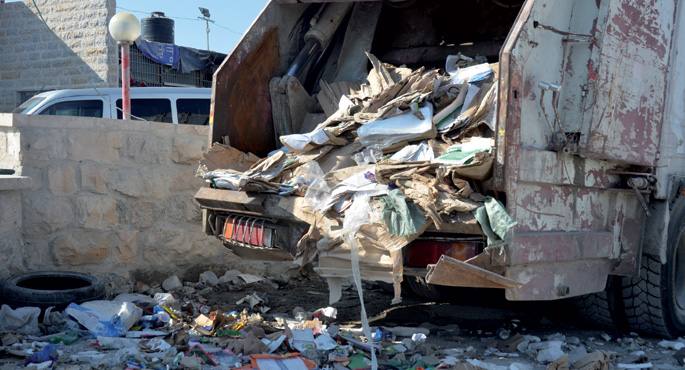
- Few conceal in Palestine that the problem of waste is serious. The desperation for Israeli occupation or the consequence of consumerism? The “plastification” of the landscape has much to say in the current political context.

A large poster signing “Ramala” between rubble, old car fragments and plastic bags invites us to the great West Bank Urbe. The smell of freshly burned trash and the noise pollution caused by traffic complete the welcome.
Next to the wall and the popular checkpoint of Qalandia. “Without occupation, of course, but Ramala represents any western city in the 1970s, where pollution was seen as a value for development and modernism,” said Alice Gray, an ecologist who teaches Environmental Sciences at the University of Abu Dis.
The Ramallah does not aspire to become the capital of Palestine, but it is the clearest symbol of the new Palestine built after the Oslo Accords. The transformation of urban spaces, the development of individualistic society and increased consumerism are relatively new trends for the Palestinians. Many experts proclaim that the new context is an example of unreal economic development generated by international flows and large NGOs in general.
Garbage can be an obvious consequence of the new reality. According to the analyses carried out by the Palestinian National Authority (PAN), 1.3 kg have been extracted in the West Bank. Every single inhabitant generates an average of garbage a day. 60 percent of this rubbish is organic. Until a few years ago, a total of 155 landfill sites were on an area of 5,600 square kilometres. The bread now aims to build three large landfills with the money that the World Bank has given it. One to the north, in the part of Janin; the second to the center, in the eastern part of Ramallah and Jerusalem; and the last to the south, between Hebron and Betleem.
In any case, there is no common policy for the management of “solid waste” in occupied territory. Each municipality or commission composed of different municipalities receives the garbage and decides where to deposit it. Many municipalities have complained, among others, that they do not have sufficient infrastructure to carry out their investments.
Lack of strategy
The commission’s director, Judeh Marcos, who is responsible for collecting the trash in the Betlem governorate, believes that the problem has a technical form: “We lack trucks and to be able to hire more staff the municipalities must pay the fee necessary to receive the service.”
But there is more than one expert who claims that in Palestine the technical problem cannot be separated from the political context. Thus, reference is inevitably made to the Israeli occupation. In Gray’s opinion, “How can we talk about a technical problem if the Palestinians have no administrative control in 61% of the West Bank’s total? How can we create a proper waste management system if each city forms an isolated island?”
In fact, the presence of garbage is clearer in areas not controlled by the PAN. Some of these areas become landfills of waste from Israeli factories and colonies, as well as traces of quarries and works. On the other hand, Palestinian villages under Israeli military control in the West Bank often have no garbage collection service. Its inhabitants, most of them peasants, are creating compost with organic waste for decades.
The fugitive areas are also clear victims of the lack of authority. The United Nations Refugee Organization (UNRAW) is responsible for collecting garbage in Palestinian refugee areas. This is often not the case, and refugees end up burning trash from containers. Thus, UNRAW has made waste management available to the municipalities. But the fugitives denounce oblivion. “We are invisible citizens and no one is responsible. Sometimes it takes weeks until they pick up the trash,” said Fadi, who is in charge of collecting plastic bags from home to home in the area of the Deishe fugitives.
The Palestinian authorities acknowledge the lack of strategy in waste management, but argue that, if there is a strategy, there is a lack of the appropriate political context to implement it. In any case, the problem has its social roots in the transformation that the Palestinians have experienced in the last twenty years. To what extent is the political context to blame for garbage and to what extent is society itself?
In search of roots
Anthropologist Sophia Stamatopoulou-Robbins has examined the problem of garbage in the city of Janin for two years. In his view, it is an example of the political landscape that has been established in the occupied territory: “Until the 1960s, garbage barely existed... Now in the fences, in the corners of the roads, in the fields... the plastic bags show the mood of the Palestinians.”
In the same opinion is political analyst Rifat Qassis: “The behaviors that at the time of the Intifadas were considered civil disobedience have today become modus vivendi. We have lost social structures and the Palestinians have begun to rebel against our communities. However, unlike what happens in the West, we don’t have regulations to control all of this.”
Therefore, is garbage an image of the indifference that has spread in society? Gray has a double test: “Yes and no. On the one hand, the feeling of not having any control over anything has underestimated the worry about garbage. On the other hand, we should remember the pollution that caused the arrival of plastics and the consumer society in the West.”
For its part, Marcos continues to hold on to the technical part: “No one forces us to throw the trash out the window. It’s a fairly new reality for us and we lack awareness.”
According to the Ministry of the Environment, garbage "divides" the landscape and "clearly bets" on waste dumps generated by the works. It takes a look and hides, that seems to be going to be done. A more determined commitment to recycling and reuse has not yet been proposed.